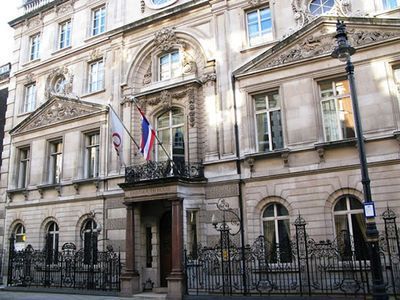Notes from the archive: T. S. Eliot and the Second World War
By BENJAMIN POORE
In a musty basement in Mayfair, boxed up beneath the offices of the English-Speaking Union (above), are the yellowed and mildewed papers that archive one of T. S Eliot’s contributions to war work.
It is fifty years since the poet’s death, but not many people know that at the end of his life he was the chairman of a large educational project called Books Across the Sea (BAS), set up in 1941 by the American typographer and anti-Fascist activist Beatrice Warde to counter Nazi propaganda that attempted to sunder relations between Britain and America (Lord Haw-Haw being a well-known example). Eliot was made president of the organization in 1943. It might be one of the most material expressions of his trans-Atlanticism – this aspect of his life and work is elaborated in Robert Crawford’s new account of Eliot’s early years.
For Warde, “mental mobilization” was vital. Everyone agreed that knitting and rolling bandages were important, she wrote, but “how often do you come across a work party of literates who are determined to wrestle with certain dangerous misconceptions that are causing trouble . . . between one Allied people and another?”
Books were the answer, and they were scarce: in 1942 Warde wrote that England was experiencing “a book famine”. “At least 20,000,000 books have been destroyed in the burning of libraries and publishing houses. The works of George Bernard Shaw…are now out of print. Yet the people are turning to reading as they never did before for escape from war strains.” The destruction of books was at the moral heart of the war effort: “The country [Germany] that began by burning its own books reached a climax in its war on enlightenment.” The fragments shored against the ruin of European civilization at the end of The Waste Land are themselves in danger of turning to cinders.
The plan was that books, especially those out of print, should be exchanged between the United States and Great Britain, as regularly as possible, and on broad topics: literature and poetry, of course, but also books on farming, ideas about postwar reconstruction, political and social history, environment and landscape. These were “Ambassador Books”, for informal discussion groups hosted by schoolteachers and open to everyone, especially the young.
They would themselves respond in making a “Hand-Made Book”, a “regional daily life scrap book”, which would travel back to the US. “Easily ten thousand young people”, a BAS document reported in 1945, “have played some direct or indirect part in the making of a book…Few of these young people will ever again imagine that ‘book’ means ‘dull mysterious thing churned out in quantity by Experts for High-brows’.”
Among Eliot’s papers I found old clippings from the TLS. In a piece from November 11, 1944, Eliot stressed the complementary character of the project’s activities. “For every piece of work done here”, he writes, “a parallel piece of work has been done by the New York circle.” “The provision of books and information about America is only one half of the book: the other half consists in supplying New York with books and information about Britain.”
Elsewhere, Eliot insisted that “the way to maintain democratic friendship between people is to multiply direct contacts between individual and individual and between group and group”. During the war, Lyndall Gordon, from the University of Oxford, suggests, Eliot came into contact with different sorts of individuals, “not the intellectual elite who had always welcomed him . . . but groups of ordinary people”; Eliot was trying “to feel his way into that sense of community”. Peter Ackroyd’s biography notes that wartime saw an impulse in Eliot that strove for “a common style”. The appeal of BAS is, in this respect, obvious, and might resonate in some ways with Eliot’s more reactionary cultural politics.
The end of the war did not see the end of the project (it continues to this day, organized by the English-Speaking Union, with whom it merged in 1946). A faded newsletter from 1946 notes that Eliot, in his Presidential Address, made a “statement of faith in the permanent establishment of Books Across the Sea”. Eliot was uneasy about the recently established peace, and saw a creeping instrumentalism compromising the “spiritual organisation” of modern life; after the war, Ackroyd writes, Eliot felt the “world was a less ‘moral’ place than it had been before”.
Eliot’s poetry can seem thousands of miles from the sentiment of this wartime project and its ad-hoc, amateur, exploratory approach. We tend to forget that there are children’s voices in The Four Quartets. But it is the juvenile energy and capriciousness of children making their own scrap books that stands out in Books Across the Sea. It also suggests a different Eliot: less T. S., perhaps, more Tom.
Peter Stothard's Blog
- Peter Stothard's profile
- 30 followers





